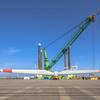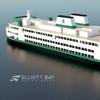11.4 million tons was bunkered in Rotterdam in 2003, as compared to 10.6 million tons in the previous year. The 7.4 percent increase meant a record for the port in terms of the amount of ship's fuels and lubricants supplied to the seagoing shipping sector. With a turnover of roughly $2 billion and direct employment for well in advance of 1400 people, it was a particularly good year for the bunker sector. Following Singapore, Rotterdam is the largest bunker port in the world.
In 2003, 20,676 bunker operations were carried out: an average of 57 per day. Captain Cornelius de Keijzer, bunker expert of the Port of Rotterdam, was pleased with the results. "A new record, while the difference in price with ports such as Singapore was less substantial than in 2002." According to De Keijzer, favorable price movements did play a role (but in relation to other ports in Western Europe) as did the scaling up in and level of service offered by Rotterdam's bunker barge fleet.
Fewer spills
Last year, the Port of Rotterdam carried out 5521 bunker inspections. The number of bunker spills remained limited to 40, not even 0.2% of the total number of operations. De Keijzer. "Ever since all ships that want to bunker in Rotterdam need to report to the Port of Rotterdam via a bunker checklist and an intensification of our inspections, the number as well as the average volume of spills has drastically decreased."
Prognosis
De Keijzer expects that roughly the same amount of bunker oil will be supplied in 2004. In addition, he predicts that a reduction of sulfur levels as proposed by the European Commission will be put into effect. This subject will also be addressed during the 25th International Bunker Conference which will take place in Bergen, Norway, from the 28th to the 30th of April. During this conference, De Keijzer (60), will retire from his work at the Port of Rotterdam. Together with the Norwegian Shipping Academy.he has organized the conference for the last ten years.
Sponsored Content
Anschuetz USA: Supporting the U.S. Maritime Industry

Maritime leaders unite to tackle ocean plastic with launch of new alliance: the Maritime Association for Clean Seas

Subscribe for
Maritime Reporter E-News
Maritime Reporter E-News is the maritime industry's largest circulation and most authoritative ENews Service, delivered to your Email five times per week










